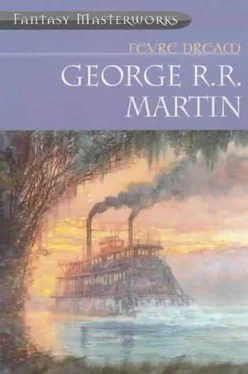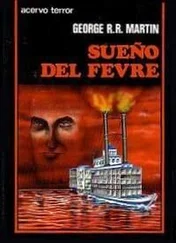George Martin - Fevre Dream
Здесь есть возможность читать онлайн «George Martin - Fevre Dream» весь текст электронной книги совершенно бесплатно (целиком полную версию без сокращений). В некоторых случаях можно слушать аудио, скачать через торрент в формате fb2 и присутствует краткое содержание. Жанр: Фэнтези, на английском языке. Описание произведения, (предисловие) а так же отзывы посетителей доступны на портале библиотеки ЛибКат.
- Название:Fevre Dream
- Автор:
- Жанр:
- Год:неизвестен
- ISBN:нет данных
- Рейтинг книги:4 / 5. Голосов: 1
-
Избранное:Добавить в избранное
- Отзывы:
-
Ваша оценка:
- 80
- 1
- 2
- 3
- 4
- 5
Fevre Dream: краткое содержание, описание и аннотация
Предлагаем к чтению аннотацию, описание, краткое содержание или предисловие (зависит от того, что написал сам автор книги «Fevre Dream»). Если вы не нашли необходимую информацию о книге — напишите в комментариях, мы постараемся отыскать её.
Fevre Dream — читать онлайн бесплатно полную книгу (весь текст) целиком
Ниже представлен текст книги, разбитый по страницам. Система сохранения места последней прочитанной страницы, позволяет с удобством читать онлайн бесплатно книгу «Fevre Dream», без необходимости каждый раз заново искать на чём Вы остановились. Поставьте закладку, и сможете в любой момент перейти на страницу, на которой закончили чтение.
Интервал:
Закладка:
George R. R. Martin
Fevre Dream
CHAPTER ONE
St. Louis, April 1857
Abner Marsh rapped the head of his hickory walking stick smartly on the hotel desk to get the clerk’s attention. “I’m here to see a man named York,” he said. “Josh York, I believe he calls hisself. You got such a man here?”
The clerk was an elderly man with spectacles. He jumped at the sound of the rap, then turned and spied Marsh and smiled. “Why, it’s Cap’n Marsh,” he said amiably. “Ain’t seen you for half a year, Cap’n. Heard about your misfortune, though. Terrible, just terrible. I been here since ’36 and I never seen no ice jam like that one.”
“Never you mind about that,” Abner Marsh said, annoyed. He had anticipated such comments. The Planters’ House was a popular hostelry among steamboatmen. Marsh himself had dined there regularly before that cruel winter. But since the ice jam he’d been staying away, and not only because of the prices. Much as he liked Planters’ House food, he was not eager for its brand of company: pilots and captains and mates, rivermen all, old friends and old rivals, and all of them knowing his misfortune. Abner Marsh wanted no man’s pity. “You just say where York’s room is,” he told the clerk peremptorily.
The clerk bobbed his head nervously. “Mister York won’t be in his room, Cap’n. You’ll find him in the dining room, taking his meal.”
“Now? At this hour?” Marsh glanced at the ornate hotel clock, then loosed the brass buttons of his coat and pulled out his own gold pocket watch. “Ten past midnight,” he said, incredulous. “You say he’s eatin’?”
“Yes sir, that he is. He chooses his own times, Mister York, and he’s not the sort you say no to, Cap’n.”
Abner Marsh made a rude noise deep in his throat, pocketed his watch, and turned away without a word, setting off across the richly appointed lobby with long, heavy strides. He was a big man, and not a patient one, and he was not accustomed to business meetings at midnight. He carried his walking stick with a flourish, as if he had never had a misfortune, and was still the man he had been.
The dining room was almost as grand and lavish as the main saloon on a big steamer, with cut-glass chandeliers and polished brass fixtures and tables covered with fine white linen and the best china and crystal. During normal hours, the tables would have been full of travelers and steamboatmen, but now the room was empty, most of the lights extinguished. Perhaps there was something to be said for midnight meetings after all, Marsh reflected; at least he would have to suffer no condolences. Near the kitchen door, two Negro waiters were talking softly. Marsh ignored them and walked to the far side of the room, where a well-dressed stranger was dining alone.
The man must have heard him approach, but he did not look up. He was busy spooning up mock turtle soup from a china bowl. The cut of his long black coat made it clear he was no riverman; an Easterner then, or maybe even a foreigner. He was big, Marsh saw, though not near so big as Marsh; seated, he gave the impression of height, but he had none of Marsh’s girth. At first Marsh thought him an old man, for his hair was white. Then, when he came closer, he saw that it was not white at all, but a very pale blond, and suddenly the stranger took on an almost boyish aspect. York was clean-shaven, not a mustache nor side whiskers on his long, cool face, and his skin was as fair as his hair. He had hands like a woman, Marsh thought as he stood over the table.
He tapped on the table with his stick. The cloth muffled the sound, made it a gentle summons. “You Josh York?” he said.
York looked up, and their eyes met.
Till the rest of his days were done, Abner Marsh remembered that moment, that first look into the eyes of Joshua York. Whatever thoughts he had had, whatever plans he had made, were sucked up in the maelstrom of York’s eyes. Boy and old man and dandy and foreigner, all those were gone in an instant, and there was only York, the man himself, the power of him, the dream, the intensity.
York’s eyes were gray, startlingly dark in such a pale face. His pupils were pinpoints, burning black, and they reached right into Marsh and weighed the soul inside him. The gray around them seemed alive, moving, like fog on the river on a dark night, when the banks vanish and the lights vanish and there is nothing in the world but your boat and the river and the fog. In those mists, Abner Marsh saw things; visions swift-glimpsed and then gone. There was a cool intelligence peering out of those mists. But there was a beast as well, dark and frightening, chained and angry, raging at the fog. Laughter and loneliness and cruel passion; York had all of that in his eyes.
But mostly there was force in those eyes, terrible force, a strength as relentless and merciless as the ice that had crushed Marsh’s dreams. Somewhere in that fog, Marsh could sense the ice moving, slow, so slow, and he could hear the awful splintering of his boats and all his hopes.
Abner Marsh had stared down many a man in his day, and he held his gaze for the longest time, his hand closed so hard around his stick that he feared he would snap it in two. But at last he looked away.
The man at the table pushed away his soup, gestured, and said, “Captain Marsh. I have been expecting you. Please join me.” His voice was mellow, educated, easy.
“Yes,” Marsh said, too softly. He pulled out the chair across from York and eased himself into it. Marsh was a massive man, six foot tall and three hundred pounds heavy. He had a red face and a full black beard that he wore to cover up a flat, pushed-in nose and a faceful of warts, but even the whiskers didn’t help much; they called him the ugliest man on the river, and he knew it. In his heavy blue captain’s coat with its double row of brass buttons, he was a fierce and imposing figure. But York’s eyes had drained him of his bluster. The man was a fanatic, Marsh decided. He had seen eyes like that before, in madmen and hell-raising preachers and once in the face of the man called John Brown, down in bleeding Kansas. Marsh wanted nothing to do with fanatics, with preachers, and abolitionists and temperance people.
But when York spoke, he did not sound like a fanatic. “My name is Joshua Anton York, Captain. J. A. York in business, Joshua to my friends. I hope that we shall be both business associates and friends, in time.” His tone was cordial and reasonable.
“We’ll see about that,” Marsh said, uncertain. The gray eyes across from him seemed aloof and vaguely amused now; whatever he had seen in them was gone. He felt confused.
“I trust you received my letter?”
“I got it right here,” Marsh said, pulling the folded envelope from the pocket of his coat. The offer had seemed an impossible stroke of fortune when it arrived, salvation for everything he feared lost. Now he was not so sure. “You want to go into the steamboat business, do you?” he said, leaning forward.
A waiter appeared. “Will you be dining with Mister York, Cap’n?”
“Please do,” York urged.
“I believe I will,” Marsh said. York might be able to outstare him, but there was no man on the river could outeat him. “I’ll have some of that soup, and a dozen oysters, and a couple of roast chickens with taters and stuff. Crisp ’em up good, mind you. And something to wash it all down with. What are you drinking, York?”
“Burgundy.”
“Fine, fetch me a bottle of the same.”
York looked amused. “You have a formidable appetite, Captain.”
“This is a for-mid-a-bul town,” Marsh said carefully, “and a formid-a-bul river, Mister York. Man’s got to keep his strength up. This ain’t New York, nor London neither.”
Читать дальшеИнтервал:
Закладка:
Похожие книги на «Fevre Dream»
Представляем Вашему вниманию похожие книги на «Fevre Dream» списком для выбора. Мы отобрали схожую по названию и смыслу литературу в надежде предоставить читателям больше вариантов отыскать новые, интересные, ещё непрочитанные произведения.
Обсуждение, отзывы о книге «Fevre Dream» и просто собственные мнения читателей. Оставьте ваши комментарии, напишите, что Вы думаете о произведении, его смысле или главных героях. Укажите что конкретно понравилось, а что нет, и почему Вы так считаете.












